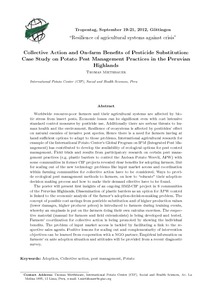Worldwide resource-poor farmers and their agricultural systems are affected by biotic stress from insect pests. Economic losses can be significant even with cost intensive standard control measures by pesticide use. Additionally there are serious threats to human health and the environment. Resilience of ecosystems is affected by pesticides’ effect on natural enemies of invasive pest species. Hence there is a need for farmers having at hand sufficient options to adapt to those problems. International agricultural research for example of the International Potato Center’s Global Program on IPM (Integrated Pest Management) has contributed to develop the availability of ecological options for pest control management. Field trials and results from participatory research on certain pest management practices (e.g. plastic barriers to control the Andean Potato Weevil, APW) with some communities in former CIP projects revealed clear benefits for adopting farmers. But for scaling out of the new technology problems like input market access and coordination within farming communities for collective action have to be considered. Ways to provide ecological pest management methods to farmers, on how to “educate” their adoption-decision making process and how to make their demand effective have to be found. The poster will present first insights of an ongoing BMZ-CIP project in 6 communities of the Peruvian Highlands. Dissemination of plastic barriers as an option for APW control is linked to the economic analysis of the farmer’s adoption-decision-making problem. The concept of possible cost savings from pesticide substitution and of higher production values (lower damages, higher producer prices) is introduced to farmers during training events, whereby an emphasis is put on the farmers doing their own calculus exercises. The respective material (manual for farmers and field extensionists) is being developed and tested. Farmers’ coordination for collective action is being promoted by showing the individual benefits. The problem of input market access is tackled by facilitating a link to the respective sales agents. Positive lessons for scaling out and complementarity of intervention objectives can be learned from cooperation with a NGO partner. Empirical information on farmers’ ex ante adoption situation and attitudes will be provided from a recent diagnostic survey.
Collective action and on-farm benefits of pesticide substitution: Case study on potato pest management practices in the Peruvian Highlands
Citation: Miethbauer, T. 2012. Collective action and on-farm benefits of pesticide substitution: Case study on potato pest management practices in the Peruvian Highlands. In: Tielkes, E. (ed). Tropentag 2012. Book of abstracts. Resilience of Agricultural Systems Against Crises. Gottingen (Germany). 19-21 Sep 2012. (Germany). DITSL. ISBN 978-3-9801686-7-0. p. 130. Abstract
2015-05-19
POTATOES
SOUTH AMERICA
PERU
poster_abstract

